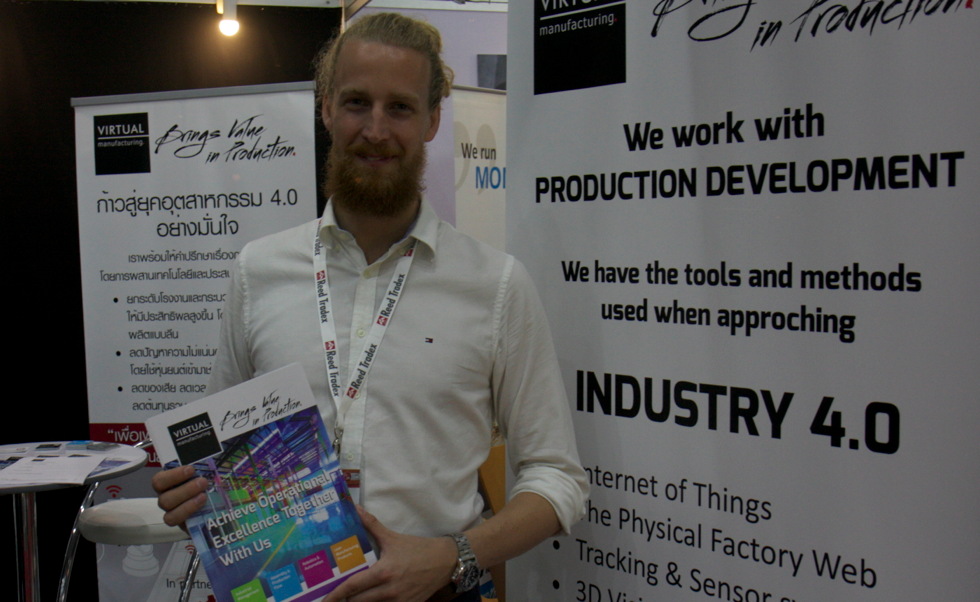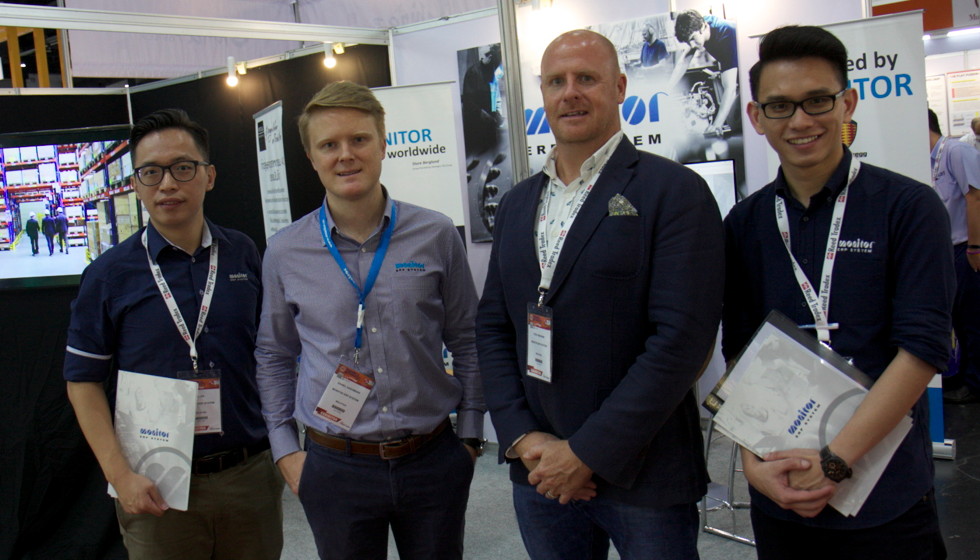On 21-24 June 2017 two Swedish solutions providers within manufacturing, one being a production improvement consultant and the other an ERP system service, successfully exhibited at the Manufacturing Expo 2017 in Bangkok. They are Virtual Manufacturing (now with offices and personnel in both Bangkok and Kuala Lumpur) and Monitor ERP System Southeast Asia (with presence here since 2013), both enablers of the path towards Industry 4.0.

Exhibiting within the ‘Smart 4.0 Zone’ they enjoyed huge interest for their services during the four days at Thailand’s largest Manufacturing and Supporting Industries Event.
“This was our second fair in Thailand but our first with a separate booth. We could see a really big interest,” Pontus Rosengren of Virtual Manufacturing reports to ScandAsia. “We got close to 300 leads so the interest was huge, with the trade show full of people and buzz the whole fair from day one up until the end of day four.”
Many wanted to start basically right away: “Two companies booked time and date for the next meeting on the spot.”

Pontus Rosengren, Virtual Manufacturing
So being in the Smart 4.0 Zone clearly benefited these Swedish companies.
Daniel Häggmark, Monitor ERP System, can only agree: “We have attended similar fairs in Kuala Lumpur and Jakarta. This is the biggest we’ve seen so far and the response was amazing, especially around our partner Virtual Manufacturing, which is really positive for us too. That very fact, that companies are so interested in becoming more efficient, having better control of their processes, etc. ultimately means that we come into the picture.”
Industry 4.0, including the ‘Smart industries’ concept, represents the coming fourth industrial revolution and the current trend of automation and data exchange in manufacturing technologies. It includes cyber-physical systems, the Internet of things, cloud computing and cognitive computing, and aims at more efficient, more flexible production.

For instance, the Swedish government has adopted a new industry strategy aiming to strengthen the industrial sector’s competitiveness and reinforce the country’s position as an attractive location for industrial production. The strategy includes Industry 4.0.
Also Thailand is highly focused on wanting to enhance their automotive and electronics manufacturing sectors, as well use as a basis to develop new industries from, and to elevate the country to a new level in industrial development.
“We are seeing interest in the entire region to raise the level of manufacturing and Thailand is at the forefront. The whole industry 4.0 hype makes companies actively looking for an ERP system that we claim is the cornerstone of the process business needs to go through to even start talking about Industry 4.0,” comments Daniel of Monitor ERP System that has rapidly gained customers and foothold in Southeast-Asia.

“An ERP system, we believe, is the hub of this, if you can call it, Industrial Revolution. It’s all about being able to connect all processes; everything from purchase to that the product reaches customer. In that chain, you need to be able to connect with suppliers, freight transport, storage machines, sensors/scanners, machines and finally customers. If you do not have a central system that can hold this together, it will be very ‘spread out’. That’s why an ERP system is the very root of this.”
For Virtual manufacturing, they relate to Industry 4.0 by being technical experts (consultants) who have standardized tools and methods to guide companies towards Industry 4.0.
 “Among other things we lead two of Sweden’s largest companies in how to reach Industry 4.0: Where are we now? What can we do in the near future? What investments must be made? etc.,” says Pontus.
“Among other things we lead two of Sweden’s largest companies in how to reach Industry 4.0: Where are we now? What can we do in the near future? What investments must be made? etc.,” says Pontus.
“Our aim with the fair is seeing that there is a great will and interest from the Thai market at the moment to work with Industry 4.0-related projects – which in many cases actually only deals with the improvement of their production under the name 4.0 but that we find to be positive. Companies have begun to realize that they can increase their margins by becoming better within production.”
Virtual Manufacturing, a complete supplier of lean-based production and logistics development services, is focused on bringing value in production, working with development before and after start of production. Through new technologies, and perspectives, their manufacturing clients can achieve “operational excellence” in a faster way.
Pontus says that values is key to the great interest and that can meet the needs of the market. “It’s not technology or cool software without seeing values such as reduced lead time and reduced manufacturing time (e.g. removing waste, reduced claims on products); using its factory area in a more efficient way; being able to increase uptime on their machines without overproducing by reducing downtime; and being able to share with our customers how to do this daily with standardized tools and methods.”
\“Our target group is really all manufacturing companies from big giants in the automotive industry to SME companies who want to get better.”

Second fr left: Daniel Häggmark, Monitor ERP System Southeast Asia, surrounded by parts of his team
Monitor ERP’s success, meanwhile, is explained by sticking to their niche with their ERP: We have only focused on small to medium-sized manufacturing companies for over 40 years. This makes our product unique in comparison with our competitors who try to offer a solution for all different industries. Thanks to this we have a complete system that fits the manufacturing industry without having to adapt the system. After 3500 installations in over 30 countries, we have the functionality and experience required to make successful implementations,” stated Daniel.

